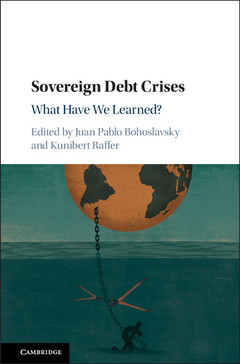Sovereign Debt Crises What Have We Learned?
Langue : Anglais
Coordonnateurs : Bohoslavsky Juan Pablo, Raffer Kunibert

Contributes to a better understanding of the policy, economic, and legal options of countries struggling with debt problems.
There is an obvious need to learn more about why some countries succeed and others fail when dealing with debt crises. Why do some sovereign debtors overcome economic problems very quickly and at minor human rights costs for their people, while others remain trapped by debts for years struggling with overwhelming debt burdens and exacerbating economic problems and human suffering? This book analyzes fourteen unique or singular country cases of sovereign debt problems that differ characteristically from the 'ordinary' debtor countries, and have not yet received enough or proper attention - some regarded as successful, some as unsuccessful in dealing with debt crises. The aim is to contribute to a better understanding of the policy options available to countries struggling with debt problems, or how to resolve a debt overhang while protecting human rights, the Rule of Law and the debtor's economic recovery.
1. Introduction: we need to learn from our experience Juan Pablo Bohoslavsky and Kunibert Raffer; 2. Managing public debt crisis in Argentina: between sovereignty and subordination Alfredo Calcagno; 3. Why developing countries should not incur foreign debt: the Brazilian experience Luiz Carlos Bresser-Pereira and Thiago de Moraes Moreira; 4. Ecuador's 2008–9 debt restructuring: a special case? Adam Feibelman; 5. Greece: an EU-inflicted catastrophe Kunibert Raffer; 6. Grenada: a small island developing state needs new ways out of its debt Juergen Kaiser; 7. Iceland: a human rights sensitive approach to deal with financial crises Juan Pablo Bohoslavsky; 8. Indonesia's 1997–8 economic crisis: a teachable case wasted Manuel F. Montes; 9. The Irish sovereign debt crisis post–2009: a lesson on why countries should never enter into unsustainable currency unions Philip Pilkington; 10. Short-term capital controls and Malaysia's fast recovery after the East-Asian crisis Marion Pircher; 11. Sovereign debt: lessons from the Mexican experience Oscar Ugarteche Galarza and Rodrigo Delgado Méndez; 12. Portugal's austerity bailout: lessons of a dangerous experiment José Castro Caldas; 13. Don't waste a serious crisis: lessons from South Africa's debt crisis Daniel D. Bradlow; 14. Lessons from South Korea: a developmental mindset makes a difference when governing the financial economy Elizabeth Thurbon; 15. The Spanish crisis: the trouble of managing debt overhang in an imperfect monetary union José Antonio Alonso; 16. Conclusions: what has been learned? Juan Pablo Bohoslavsky and Kunibert Raffer.
Juan Pablo Bohoslavsky is a United Nations Independent Expert on Foreign Debt and Human Rights. He previously worked at the United Nations Conference on Trade and Development (UNCTAD) and as a consultant for the United Nations Economic Commission for Latin America and the Caribbean (ECLAC). A doctor of law with wide experience in international relations and litigation, he is the author of numerous books and articles on sovereign financing, economic complicity, and human rights.
Kunibert Raffer was an associate professor (retired September 2016) at the Department of Economics, Universität Wien, Austria; Honorary Professor of the Universidad Nacional de Río Negro, Argentina; member of the Sovereign Bankruptcy Group of the International Law Association; 1989 Visiting Fellow at the Institute of Development Studies (Sussex) invited by Sir Hans (HW) Singer with whom he co-authored two books; and 1990–93 Honorary Research Fellow, Department of Commerce, University of Birmingham. In 1998 he participated in the United Nations Development Programme's research project 'International Development Cooperation and Global Public Goods.' He is a former lecturer at the United Nations Institute for Training and Research (UNITAR) (on debt and the Millennium Development Goals), and he proposed a model of sovereign insolvency (Raffer Proposal).
Kunibert Raffer was an associate professor (retired September 2016) at the Department of Economics, Universität Wien, Austria; Honorary Professor of the Universidad Nacional de Río Negro, Argentina; member of the Sovereign Bankruptcy Group of the International Law Association; 1989 Visiting Fellow at the Institute of Development Studies (Sussex) invited by Sir Hans (HW) Singer with whom he co-authored two books; and 1990–93 Honorary Research Fellow, Department of Commerce, University of Birmingham. In 1998 he participated in the United Nations Development Programme's research project 'International Development Cooperation and Global Public Goods.' He is a former lecturer at the United Nations Institute for Training and Research (UNITAR) (on debt and the Millennium Development Goals), and he proposed a model of sovereign insolvency (Raffer Proposal).
Date de parution : 11-2017
Ouvrage de 304 p.
15.8x23.5 cm
Disponible chez l'éditeur (délai d'approvisionnement : 14 jours).
Prix indicatif 127,71 €
Ajouter au panierDate de parution : 12-2018
Ouvrage de 308 p.
15.1x23 cm
Disponible chez l'éditeur (délai d'approvisionnement : 14 jours).
Prix indicatif 34,17 €
Ajouter au panierThème de Sovereign Debt Crises :
© 2024 LAVOISIER S.A.S.


